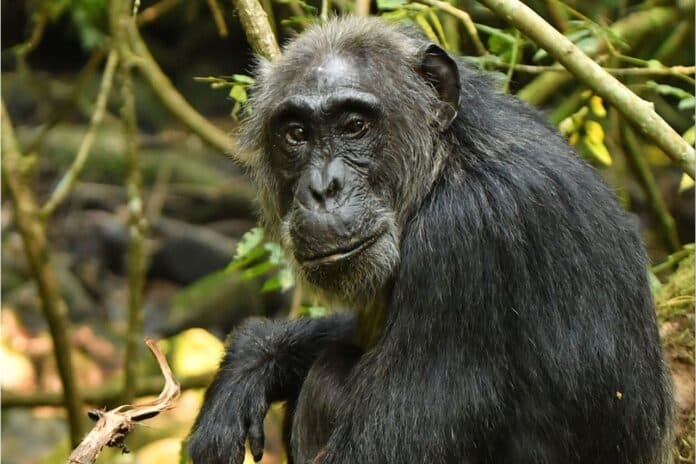Researchers who studied wild chimpanzees in Uganda’s Kibale National Park for 20 years found that female chimps can go through menopause and live beyond their reproductive years.
This discovery, described in the report ‘Demographic and hormonal evidence for menopause in wild chimpanzees’ published in Science, is significant because previously, menopause and post-reproductive survival were only seen in a few types of whales and humans among primates. These findings provide valuable insights into why menopause happens in nature and how it evolved in our species.
Brian Wood, UCLA associate professor of anthropology, said, “How this life history evolved in humans is a fascinating yet challenging puzzle.”
Wood, the principal author of the paper, collaborated closely with Kevin Langergraber from Arizona State University, Jacob Negrey from the University of Arizona, and John Mitani and David Watts, who are the founders and co-directors of the Ngogo Chimpanzee Project.
The study’s findings suggest menopause and post-reproductive survival can occur in a social system different from ours, even without grandparental support. This challenges the grandmother hypothesis, which indicates that post-reproductive females can help their genes by aiding their children or grandchildren.
While this theory holds for humans, the social structure of chimpanzees differs significantly. Unlike humans, older female chimpanzees at Ngogo typically don’t live near their daughters or care for their grandchildren. Yet, they still live beyond their childbearing years.
While long-lasting post-reproductive life in wild chimpanzees hasn’t been commonly seen in past studies, it has been observed in chimpanzees and other primates in captivity. This could be because captive chimpanzees get good food and medical care. The extended post-reproductive life of female Ngogo chimpanzees may be a response to their unusually favorable living conditions, including lots of food and low predator threats.
On the other hand, chimpanzees naturally have longer post-reproductive lives. However, this trait has yet to be noticed in other chimpanzee groups due to the adverse effects of human activity.
Langergraber said, “Chimpanzees are extremely susceptible to dying from diseases that originate in humans and to which they have little natural immunity. Chimpanzee researchers, including us at Ngogo, have learned over the years how devastating these disease outbreaks can be to chimpanzee populations and how to reduce their chances of happening.”
The research team studied 185 female chimpanzees by looking at data from 1995 to 2016. They figured out how much of their adult life the females spent after they could no longer have babies. They also tested hormone levels in urine samples from 66 females ages 14 to 67.
To do this, the team spent much time in the Ngogo area, observing and collecting samples from the chimpanzees. Tobias Deschner and Melissa Emery Thompson analyzed the hormone samples.
Negrey mentioned, “This study required an enormous amount of effort. We could only do it because our team has watched these chimpanzees for many years. This allowed us to be sure that some females keep living even after they can’t have more babies. We also spent a long time in the forest collecting urine samples to study menopause-related hormones.”
The researchers checked hormones associated with human menopause, like increasing levels of follicle-stimulating hormone and luteinizing hormone and decreasing levels of estrogen and progestins.
In line with other chimpanzee groups and humans, the chimps’ ability to have babies decreased after they turned 30, and no births were seen after age 50. The hormone data revealed that the Ngogo chimps underwent a menopausal transition similar to humans, starting around age 50.
Just like humans, it wasn’t uncommon for these female chimps to live beyond 50. A female who grew up at 14 was past her childbearing years for about one-fifth of her adult life, which is almost half the time of a human hunter-gatherer.
Wood said, “We now know that menopause and post-fertile survival arise across a broader range of species and socio-ecological conditions than formerly appreciated, providing a solid basis for considering the roles that improved diets and lowered risks of predation would have played in human life history evolution.”
The researchers emphasize the importance of monitoring the behavior of older chimpanzees and studying how they interact with and impact other group members.
Wood added, “To facilitate such research, it’s crucial to back extended studies of wild primates.”
This study highlights the significance of long-term field research on wild primates and the necessity of sustained support for such studies. It not only deepens our knowledge of chimpanzee biology but also offers insights into the evolution and importance of menopause in humans.
Led by a UCLA researcher, this groundbreaking research challenges existing ideas about menopause in the animal kingdom, paving the way for new investigations into the reproductive biology of our closest animal relatives.
Journal reference:
- Brian M. Wood, Jacob D. Negrey et al., Demographic and hormonal evidence for menopause in wild chimpanzees. Science. DOI: 10.1126/science.add5473.
